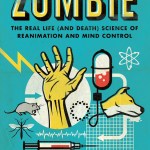zombies
[Obvious warning is obvious: potential spoilers for A Song of Ice and Fire novels/Game of Thrones TV series below].
While no one will claim that George R.R. Martin's epic series, "A Song of Ice and Fire," is historically accurate, there are a number of historical parallels that can be drawn from the characters and plotline--particularly from medieval Europe. While most of those relate to epic battles or former monarchs or other royalty, another of Martin's characters, so to speak, is the disease greyscale (1).
Greyscale is a contagious disease that seems to come in at least two distinct…
There are certain myths that are frustratingly resistant to evidence, science, and reason. Some of these are basically medical conspiracy theories, where someone (industry and/or big pharma and/or physicians and/or the government) has slam-dunk evidence for harm but conspires to keep it from you, the people. For example, despite decades worth of negative studies, the belief that vaccines are harmful, causing conditions ranging from autism to sudden infant death syndrome, to all varieties of allergies and autoimmune diseases, refuses to die. Fortunately, this myth is one that, after more than…
I have a paper out in the Christmas issue of BMJ on the coming zombie apocalypse.
You read that right. And yes, it was peer-reviewed.
I've discussed previously how I've used the attention paid to zombies to talk about infectious diseases with children and other audiences; and to bring some science to the Walking Dead and other zombie tales. I even include a zombie lecture as part of the talks I give in my position as an American Society for Microbiology distinguished lecturer.
Why?
Like them or hate them, zombies are part of the zeitgeist. The Walking Dead is still one of the…
Part I: the microbiology of zombies
Part II: ineffective treatments and how not to survive the apocalypse
Part III: “We’re all infected”
Part IV: hidden infections
Part V: beware the bite?
Now that seemingly the flu outbreak storyline has been wrapped up on The Walking Dead (unsurprisingly, but disappointingly, with their ineffective treatments proving to be miracle cures), there's still one more zombie microbiology topic I'd like to cover: what's up with the bite, and is it the cause of death? I said previously:
"We know the pathogen can certainly be spread by bites and then cause zombification that way..."
but one commenter disagreed, noting:
"I don’t think we have evidence for that from the show. I think it clearer that zombie bites cause death, and there…
On Aetiology, Tara C. Smith continues her series on the science of The Walking Dead, explaining how diseases spread and how they might cause zombiism. One thing that would be observed in any real contagion would be an incubation period— the time between when a virus (for example) enters your body and you start showing symptoms of infection. For a virus like the flu, this could be about two days during which you don’t feel sick but could still be infecting people around you—even if you don’t bite them. Tara also expresses nerd rage at the show's "doctors" pursuing antibiotics to…
(As previously, spoilers abound)
So on this week's Walking Dead soap opera, we find that Daryl/Michonne's group is still out and about searching for medical supplies. Back at the prison, the food situation is dire (apparently all the food stores were in the cell block where the infection broke out), so Rick and Carol head out to look for both medicines and food from the local 'burbs. During their outing, discussion ensues of Carol's attempt to stop the prison's apparent influenza outbreak by killing two people who, at that point, were the only ones showing symptoms of disease. Rick decides he…
Warning: here be spoilers
In many latter-day zombie movies, books, and TV shows, zombie-ism has a biological cause. In 28 Days Later, the infection is caused by the "Rage" virus, which escaped from a lab when animal rights activists break in and release a group of infected chimpanzees. Of course, one of the animals promptly bites one of its "liberators," and the infection spreads rapidly throughout Great Britain. In Zombieland, it's a mutated form of "mad cow" disease. The Crazies, it's the Trixie virus; World War Z, the Solanum virus; Resident Evil, the T virus. I could go on and on.…
(Spoilers. And things.)
After the start of season 4 of the Walking Dead and the introduction of a new nemesis: a fast-spreading, deadly infectious disease that seems to be a strain of influenza, I was looking forward to the plot arc of this season.
And then episode 3, "Isolation", happened. From an infectious disease standpoint, I say, bah.
At the end of the previous episode, "Infected", the group had decided to lock up anyone who was showing signs of the infectious disease within the death row cellblock, so that they would not further spread the disease, and to put the children and elderly (…
(Spoilers below!)
For Walking Dead fans and readers of this blog, you probably know why I was all excited about some of the plot elements that have been included thus far this season: possible zoonotic disease, and in particular, a potential influenza outbreak that may have originated in pigs. I muse about this and other infections in an article for Slate.com, and will have additional thoughts about zombies and infectious disease more generally in the coming days.
See also:
Part II: ineffective treatments and how not to survive the apocalypse
Part III: "We're all infected"
Part IV:…
Before James Lovelock conceptualised the world as a single organism (the Gaia hypothesis), he would spend his lab hours freezing hamsters into solid blocks of ice before reanimating them.
Image from The physiology of induced hypothermia: proceedings of a symposium, 28-29 October 1955
Sci-fi and fantasy author Richard Matheson has passed away aged 87, leaving behind a legacy of books, TV and film. Even if you don't recognise his name, you will probably have seen his work on screen. Many of his stories were adapted for film, including I Am Legend, Duel, and A Stir of Echoes, and he wrote perhaps the most famous Twilight Zone episode of all time, Nightmare at 20,000 Feet. I don't normally write memorials but I feel I owe Matheson one because he's responsible for one of my generation's most enduring monsters - the zombie.
Now, zombies were around before Matheson, of course -…
Those still sitting on the fence over whether to buy this month's best pop science debut about zombies can read a review by the kind folks at Arc magazine here, and read an extract from the book in Salon magazine, entitled: Russians Who Raised the Dead:
Bryukhonenko had heard about Kuliabko’s experiments with humans and he was ready to try his own hand at them. He enlisted the help of the experimental surgeon Sergeo I. Spasokukotey, who had helped to engineer the network of blood banks across the Soviet Union. In 1934, showing a similar level of disregard for a person’s self-…
At long last, my book on zombies is out!
Without doubt the maddest thing I ever did on a whim
You can purchase How to Make a Zombie at all good bookstores in the UK and USA, or online. I'm indebted to a whole host of people for the book ever reaching the light of day, foremost my agent Peter Tallack and my incredible editor at OneWorld, Robin Dennis, and fellow wordnerd Aarathi Prasad for planting the seed in my head.
So yeah, go buy ten copies of it so I can eat tonight.
When I was pitching my book back in 2010, quite a few publishers said that vampires were hot, and zombies were not.
Muahahahaha.
(How to Make a Zombie is out in June from OneWorld)
And now for something a bit different. I've mentioned before that I'm a big fan of zombies. So, I was intrigued when I started seeing press for Warm Bodies, a book by Isaac Marion about a zombie who is, well, not your typical zombie. Recently released as a feature film, I read the book a few weeks ago, and last weekend took my 13-year-old daughter to see the movie. I enjoyed both (as did my daughter), and asked Isaac if he'd be willing to answer a few questions for the blog. His interview is below (a few spoilers, take note):
Tara: Your take on zombies is a bit different than most stories.…
With my colleague Greg Tinkler, I spent an afternoon last week at a local public library talking to kids about zombies:
The Zombie Apocalypse is coming. Will you be ready? University of Iowa epidemiologist Dr. Tara Smith will talk about how a zombie virus might spread and how you can prepare. Get a list of emergency supplies to go home and build your own zombie kit, just in case. Find out what to do when the zombies come from neuroscientist Dr. Greg Tinkler. As a last resort, if you can't beat them, join them. Disguise yourself as a zombie and chow down on brrraaaaiiins, then go home and…
When I saw the latest screed from that very living embodiment of crank magnetism, Mike Adams, I chuckled. I sent it around to some fellow skeptics, including, for instance, the crew at The Skeptics' Guide to the Universe, as well as acquaintances and friends of mine because I couldn't believe it. Adams, as loony as he is, had topped himself. In the meantime, I couldn't decide whether or not to write about it, particularly after Steve Novella took a swipe at it. After all, there are things that are so loony, so out there, that one seriously has to worry about whether they are the result of…
Have two awesome announcements that I've been waiting to share. One will still have to wait a few more days as we're finalizing some details, I can now let you know that I just started a new position as an Advisory Board member of the Zombie Research Society. It's a pretty cool group, including THE George Romero (Zombie Godfather); Daniel Drezner, author of Theories of International Politics and Zombies, and Steven Schlozman, author of The Zombie Autopsies. Plus a bunch of other white guys.
So, why do something like this? Zombies obviously are huge in pop culture, and typically "zombieism"…
A number of readers have asked me what I think about the Wall Street protests. In general I think public protest is usually a good thing, and I'm pleased to see demonstrations in favor of good things like corporate accountability and against bad things like climate change. I think there are plenty of reasons for political activism in our country, and am always pleased by it.
On the other hand, do I think that this is the beginning of something profound and important? I can't say for sure, but I would guess not. Protesting Wall Street isn't a bad idea - but there's a fundamental problem in…





